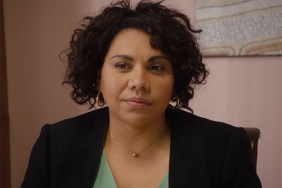Kais Nashef as Said
Ali Suliman as Khaled
Lubna Azabal as Suha
Amer Hlehel as Jamal
Hiam Abbass as Said’s Mother
Ashraf Barhom as Abu-Karem
Mohammad Bustami as Abu-Salim
Summary:
Giving us a very different view of the situation in the Mideast, this powerful film is one that’s not so easily shaken or forgotten.
Story:
Childhood friends Said and Khalid, both Palestinians, have been recruited for a deadly suicide mission to Tel Aviv. When things go wrong and they get separated, they have to decide whether to carry through with it or not.
Analysis:
If you were to suggest to most Americans to watch a movie about Palestinian suicide bombers, they’re probably not going to be very comfortable with the idea, because any time suicide bombers are mentioned in the news, it’s usually to report the death and destruction they’ve caused. After watching “The War Within,” a dreadfully boring attempt at humanizing terrorists that hits much closer to home, I wasn’t too excited to sit through another one.
Thankfully, director Hany Abu-Assad’s “Paradise Now” is a different animal. It shows a side of the Mideast conflict that we don’t often see, that of the Palestinians driven for various reasons to commit acts of terror. Not that it dares to make them look like misunderstood heroes. Instead, Abu-Assad tries to get into their minds and show that the men who commit these deeds aren’t that different from us. It’s an amazing achievement, if only for the fact that a film about such a sensitive subject matter could be shot in and around the hotbed of Israel. Politics aside, it still works as a fine dramatic film.
The film starts with an introduction to childhood friends Said and Khaled, who are pretty much like other guys their age, hanging out and getting into trouble at their dead-end job. Only difference is that their day-to-day life is constantly threatened by the danger of Israeli rockets. This introduction is a nice bit of misdirection for the drama that is to follow, as the two friends are called upon by an unnamed Palestinian faction to strike a blow against Tel Aviv. Cleaned up and dressed in nice suits, they’re still the bumbling guys we met earlierthey flip a coin to decide who will blow themselves up firstbut they’re both quite likeable, creating even more tension as things build to their suicide mission. Of course, something goes wrong and they’re separated. While Said runs around with an active bomb strapped to his chest, Khaled desperately tries to find his friend and keep him from going through with it.
This type of movie could be very one-sided in the way it depicts the conflict in Israel, but Abu-Assad, a Palestinian himself, does a fine job creating a well-balanced picture of why suicide bombers might do what they do. As an American, it’s hard to watch the film, because for good reason, we’ve been taught to not like terrorists, but here, we see two very unassuming guys called upon to kill themselves in the name of freedom, and we’re given both sides of the equation in that respect.
The main reason the film works and we can watch it with any degree of sympathy is because of the fine performances by both lead actors. At first, Khaled seems like the zealot of the two, ready to do what needs to be done, while Said seems to have more reservations. Once they get separated, Said starts to find out he has reasons to live, when he tries to get help, but the deadly package keeps him at a distance from those he loves. This part of the film will really keep you on edge, since you’re never sure what’s going to happen, and there are many powerful images and moments. It’s a nice testament to Kais Nashef as an actor that he is able to carry much of the film with little dialogue, giving it a bit of a European feel. (The trailer is a bit deceptive in that it plays down that this is a foreign language film.)
Although “Paradise Now” is about a serious subject matter, it’s not nearly as heavy as you might immediately think. In some ways, it’s a bit like “City of God” and “No Man’s Land,” allowing moments of levity to inject themselves into the tension-filled drama of real world conflict. It’s often the sugar that helps the medicine go down. There’s also a bit of a romantic angle as Said gets involved with Suha, the daughter of his boss–a nice supporting performance by Lubna Azabal- who should be reason enough for Said to stick around.
There’s little question in my mind that many Palestinians have been oppressed by Israeli military powers, but that doesn’t mean I support the tactics being used to try to attain peace. In that sense, the movie sends mixed messages, because you’re never quite sure whether Hany Abu-Assad is trying to humanize the suicide bombers or to show how pointless the whole struggle is, as a message for peace. Still, the central themes of friendship and struggling with one’s conscience make this worthwhile regardless of your political inclinations or viewpoint.
The Bottom Line:
“Paradise Now” is an amazing achievement on many levels, an important film that should be seen by anyone who might need a bit more perspective on the Mideast situation from a different point of view.










